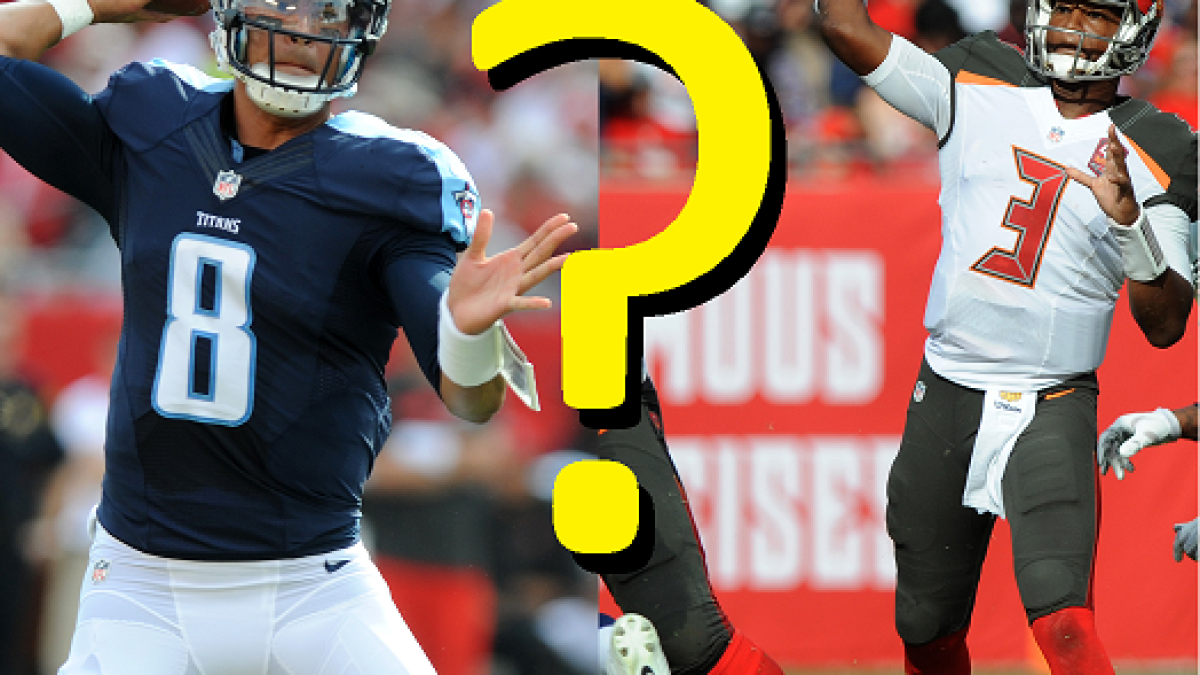Jameis Winston and Marcus Mariota will forever be linked. For just the sixth time in the Super Bowl era, quarterbacks were taken first and second in the NFL draft in 2015 (it happened again in 2016), with Winston going first to Tampa and Mariota going second to the Titans. And just like Peyton Manning and Ryan Leaf or Andrew Luck and Robert Griffin III, Winston and Mariota will always be compared to each other.
And luckily for both the Bucs and Titans, both quarterbacks have had success at least enough that neither team regrets their decision. But which one should you choose for your fantasy team in 2017? They have similar average draft positions— Winston is the QB7 and being taken during the sixth round, while Mariota is the QB10 and taken in the eighth. They also have the potential to finish higher than their current ADP, which makes it a tough decision. Let’s dive in.
The players
Both Winston and Mariota finished as low-end QB1s last year. Winston threw for 4,090 yards and 28 touchdowns, finishing as the QB10. Mariota threw for 3,426 yards and 26 touchdowns and added 349 yards on the ground (sixth-most among quarterbacks) to finish at the QB11. Winston had a 60.8 percent completion percentage and 7.2 yards per attempt, while Mariota had a 61.2 percent completion percentage and 7.6 yards per attempt. On the surface, they look very similar. But if you dig a little deeper, there are some differences between the two.
One of them is the rushing total. While Mariota had 349 rushing yards, Winston had just 165 on the ground, good for 15th. Over the course of a season, Mariota’s per-game average of 23.3 yards compared to Winston’s 10.3 amounts to more than a point per game for your fantasy team. Another number that sticks out is the turnovers. Winston was second in the league with 18 interceptions and saw his interception rate tick up from his rookie season from 2.8 to 3.2. He also tied for the lead among quarterbacks with six fumbles lost. Meanwhile, Mariota had just nine interceptions and saw his interception rate drop from 2.7 to 2.0.
Perhaps the most succinct difference is their efficiency. When factoring in touchdowns, rushing yards, turnovers, etc., Winston averaged 0.44 points per dropback last year, good for 16th in the league. Mariota averaged 0.56, tied for fourth with Tom Brady. He placed behind NFL MVP Matt Ryan, NFL Rookie of the Year Dak Prescott and future Hall of Famer Aaron Rodgers — not bad company.
Advantage: Mariota. While both have similar efficiency numbers in the passing game, it’s the running game and turnovers that swing it towards Mariota. While Mariota is like a diversified portfolio, leaving less to be exposed, it’s all or nothing on passing volume for Winston.
The situation
The talent around both Winston and Mariota has been significantly upgraded. For Mariota, the Titans used the fifth overall pick on what many considered the top receiver in the draft, Corey Davis. The Titans added two more pieces later in the draft, trading up for receiver Taywan Taylor in the third along with selecting tight end Jonnu Smith. If that wasn’t enough, they signed veteran Eric Decker after he was released by the Jets. Of all the additions for Mariota, Decker should have the most immediate and largest effect. Injuries derailed Decker’s 2016 season but in 2015, he finished sixth in wide receiver rating (the passer rating a QB has when throwing to a receiver). He also finished ninth in deep pass percentage, catching 39.1 percent of balls thrown over 20 yards (among receivers with at least 23 such targets). He and Rishard Matthews, himself finishing 19th in wide receiver rating and fifth in deep ball percentage, will provide Mariota with two sure-handed veteran receivers to along with the potentially explosive Davis. All these weapons and that’s without mentioning tight end Delanie Walker, coming off his third straight TE1 season of at least 60 catches and 800 yards. He’s finished no worse than seventh among tight ends in yards per route run over that span.
Winston also received upgrades in the passing game, most notably in the form of DeSean Jackson. He’s coming off his fifth 1,000-yard season in nine seasons and a 107.2 wide receiver rating, good for 13th last season. There’s no doubt he represents an upgrade over the likes of Russell Shepard and Adam Humphries. Jackson finished second in the deep ball (targets of 20-plus yards) catch percentage, hauling in 50 percent of such targets. But can Winston take advantage? Winston finished 20th in the league with a deep ball completion percentage, completing just 34.8 percent of them. Compare that to Jackson, who was catching balls last season from Kirk Cousins, who finished ninth. It’s possible Jackson won’t get as many chances to show off his deep threat ability as he did last year.
The other addition was first-round pick and tight end O.J. Howard. Howard is widely expected to contribute more as a blocker this year rather than a pass-catcher, as Tampa still plans on utilizing surprise contributor Cameron Brate. Brate finished as PFF’s 11th-rated tight end and sixth-ranked fantasy tight end last season, while Howard had the top run-blocking grade of any college tight end last year. In short, utilizing both will only help Winton’s cause.
And last but certainly not least, Winston continues to have the services of Mike Evans, a bona fide stud at receiver. He finished as PFF’s second-highest-graded receiver in 2016 and finished behind only Julio Jones, A.J. Green, and T.Y. Hilton in yards per route run. The addition of Jackson should only help draw away coverage from Evans, freeing him up to excel again.
Advantage: Winston. While Tennessee made significant upgrades to their receiving corps, the Bucs may have one-upped them with Jackson. Having Mike Evans is also hard to match.
The outlook
Luckily for both Winston and Mariota, they have the same play-callers back for 2017. Instead of having to learn a new playbook and schemes, they have the luxury of a whole offseason to practice what they already know.
In Winston’s case, he has Dirk Koetter calling the plays for the third straight year. Koetter has never run a balanced offense, shifting to a heavy run-based offense or extremely pass-happy. For example, during his five years as offensive coordinator in Jacksonville, his offenses finished in the top four in rushing attempts three times. He then moved on to call the plays in Atlanta, where his teams finished in the top eight of pass attempts all three years he was there.
Now Koetter is back in Florida, where his offenses have been in the top eight of rush attempts the last two years — in 2015, when he was the offensive coordinator, and 2016, when he was the head coach. Focusing on the run is probably a good thing in Winston’s case. Koetter realizes that Winston doesn’t have as diverse of a skill set as Mariota and is a bit of a gunslinger (hence the 18 interceptions) so the less opportunities to turn the ball over the better.
For Mariota, he gets a second year under coach Mike Mularkey and offensive coordinator Terry Robiskie. Robiskie and the Titans also prefer to employ the run, finishing fourth in rush attempts but, unlike Winston, Mariota is much more involved. Not only did he finish sixth in rush attempts by a quarterback but he was third in yards per carry. The Titans also plan to give Mariota more leeway when it comes to changing the play at the line of scrimmage when he sees danger, which should only help Mariota’s numbers.
Advantage: Push. Both have the advantage of working in the same system and for the same coaches with no major changes to the offense expected.
The decision
Marcus Mariota. Both quarterbacks are on good teams surrounded by familiarity in the coaching staff. Both were also blessed with upgrades around them both through free agency and the draft. But between the rushing dynamic and the fact that Mariota appears to have progressed as a passer compared to Winston ticking upward in that department, I would rather roll with Mariota on my fantasy team in 2017.



 © 2026 PFF - all rights reserved.
© 2026 PFF - all rights reserved.